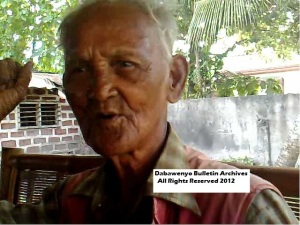“Dangan…” says Bastida (+), a Bagobo from Baguio District Davao, “kung doon mgo samuk……diyon po ma sokkad nga lugaa…, pononggolingan noko patoy…, iddos Datu kodpo paistoryay no koilangan obayaran od tamukan. Panavukan kos ngaran, amoy iddos so nakapatoy konnad od imotayan.”
During the olden days, whenever there was dispute or disorder in a Bagobo community, a Datu would be called to act as arbiter between the parties. In a crime of murder for example, where there is an explicit breakdown of harmonious relations, Bastida says that a panavuk (wergild) would be demanded by the Datu from the offending party as restitution for the damages he had previously caused the aggrieved parties. The concept of wergild for damages is based on the customs of the Bagobo people as necessitated in preserving the peace of the community. Now both parties, having agreed to terms of the Datu, would settle their differences by the number and perhaps the value of the articles (wergild) that would be submitted by the offending party to the tribunal. Articles such as a palihuma (sword), kuda (horse), kabow (water buffalo), ahung (large gongs), kaasag (shield), spear (budyak), goats, chickens and other things of value are eventually offered to the person of the disgraced party. Upon appraisal of the offering and approval, these same articles are accepted by the angered parties within the purview of the Datu and the buyyag (elders and functionaries).
This is where the honor and the dignities of the parties are eventually restored.
The Bagobo Datu found his relevance as leader, arbiter and lawgiver before the arrival of the Spanish in the Philippine islands in the 1500’s. He is famed to be the most knowledgeable of the customs of his people and on many reported historical instances, reputed to be the fiercest and the strongest. Whenever there are infractions of the custom law, he answers back by personifying his role as the lawgiver and arbiter of justice in the community. By substance, Bagobo tribal sense of justice is based on batassan (customary law). This summarizes the general respect for ancient customs, traditions and respect of elders of the community, for whom much of the culture, beliefs and idealogy is derived. These customary laws are interpreted assertively by the Chieftains (Datus), who best represent the common interest. Further, in the work of Philippine Anthropologist E. Arsenio Manuel (who stayed briefly in Davao during his field work in the 60’s), “Manuvu Social Organization, first published 1973”, he states that, “Native Datus are non-literate but vocal and assertive in their own language. They are intelligent and thinking men. They are aware of their responsibility…”.
Today, a Datu still bears the same responsibility. An existing Datu anywhere in this country still bears the hallmark of his people. He is her pride. Her banner. Her leader, dispenser of justice and arbitrator. Even the as the planet is rapidly plunging into the throes of the technological 21st Century, the Datu faces critical challenges of his time. Mining, logging, destruction of his culture, bastardization of his spirituality and encroachments of his lands. In the world of corporations, hardly a day passes where he and his kind are pushed to the limits.
It is an enigma to think how a leader, such as a Datu, would face all these social pressures affecting his community.
Would he eventually capitulate to modernization?
Does he have enough moral means to sustain the fight against corporate greed and apathy?
Could he handle a bigger world and even bigger world problems such as pollution, natural calamity and disease waiting to rain down on him and his people?
Only time will tell.
But for the time being, let us allow ourselves the comfort of knowing that his time has not yet passed.
He is still there. In the forests, in the mountains, in the cities, fighting for his self-respect.
History cannot be rushed and a Datu is still the best leader of his people.
And he will be remembered.


